iPhone Data Recovery
 Phone to Phone Transfer
Phone to Phone Transfer
The easy 1-Click phone to phone data transfer to move data between iOS/Android/WinPhone/Symbian
Restore-iPhone-Data Products Center

 Android Data Recovery
Android Data Recovery
The Easiest Android data recovery software to recover Android lost or deleted Files
 Phone Manager(TunesGo)
Phone Manager(TunesGo)
Best iOS/Android phone manager tool to manage your phone’s files in a comfortable place
 Phone to Phone Transfer
Phone to Phone Transfer
The easy 1-Click phone to phone data transfer to move data between iOS/Android/WinPhone/Symbian

iOS Toolkit
A full solution to recover, transfer, backup restore, erase data on iOS devices, as well as repair iOS system and unlock iPhone/iPad.

Android Toolkit
All-in-one Android Toolkit to recover, transfer, switch, backup restore, erase data on Android devices, as well as remove lock screen and root Android devices,especially Samsung phone.
Proxyserver, smsmanager, alarm controller, battery controller and wallpaper service are the names of an android virus available in accessibility settings but this is not the real name of this app. Real name of this trojan is ghost push which affects more than 65000 android phones. If you turn of this it will automatically turn on.

Can my Android phone get a “virus”?
Apps designed to personalize people’s Android-based phones are most susceptible to be compromised, as well as entertainment and gaming apps. Some of the most malicious apps in the Google Play store downloaded since 2012 were Wallpaper Dragon Ball, a wallpaper app, and the games Finger Hockey and Subway Surfers Free Tips. Both Wallpaper Dragon Ball and Finger Hockey, have malware that steals confidential information such as device IDs from infected devices. Subway Surfers Free Tips, meanwhile, uses a Trojan called Air Push to bypass a device’s security settings and subscribe infected phones to premium services.
As Android malware, cyber criminals create malware-spreading apps in devious attempts to steal personal details and advertisers use it as a marketing channel by bundling pushy ads with apps. In the first case, the users’ mobile security is clearly compromised. In the second one, the ad-app bundle is seldom mentioned, so users who download it unknowingly face a mobile privacy threat.
Pirated or cracked apps are another way that cybercriminals use to infected Android phone with malware. They get legitimate Android application package (APK) file and binding it with a malicious program is a relatively simple process to infect the Android phones. Most pirated or cracked apps usually contain some form of malware so the best recommendation is still to think twice before installing untrusted software or clicking on strange-looking links.
What can an Android “virus” do?
The vast majority of malware on Android is focused on stealing your information, here are the most common Android malicious apps will do at least one of the following:
1. Collect and send GPS coordinates, contact lists, e-mail addresses etc. to third parties
2. Send SMSs to premium-rate numbers
3. Subscribe infected phones to premium services
4. Record phone conversations and send them to attackers
5. Take control over the infected phone
6. Download other malware onto infected phones
7. “Push notifications ads” delivering alerts to a phone’s notification bar – when the user swipes to pull down the notification bar from the top of the screen, an ad shows up under Notifications.
8. “Icon ads” inserted onto a phone’s start screen – when the user touches the icon, it usually launches a search engine or a web service.
Android phone will get infected with viruses from a malicious app that is installed on the smartphones. In this first step, we will try to identify and uninstall any malicious app that might be installed on your Android phone.
Setp 1. To uninstall the malicious app from your Android device, go to the Settings menu, then click on Apps or Application manager (this may differ depending on your device).
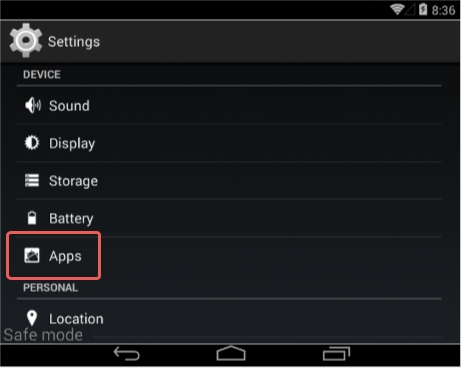
Setp 2. This will bring up a list of installed apps, including the malicious app. If you cannot find the malicious app, we advise you to uninstall all the recently installed apps.
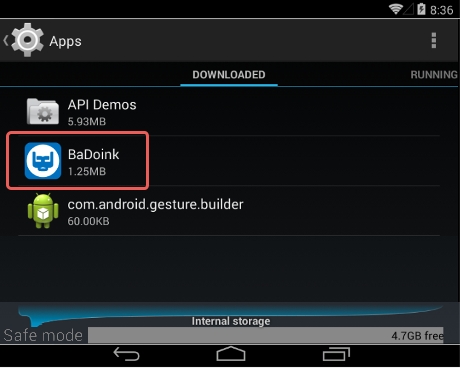
Step 3. Touch the app you’d like to uninstall.This won’t start the app, but will open up the program’s App Info screen, then click on “Uninstall” button.
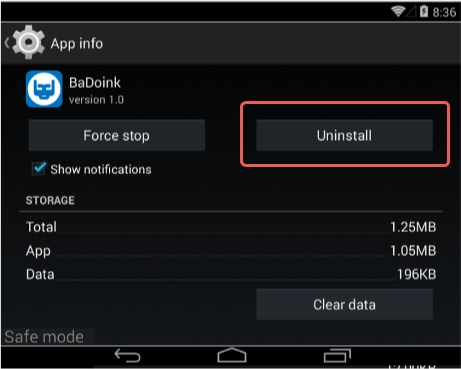
Step 4. A confirmation dialog should be displayed for the malicious app, click on “OK” to remove the malicious app from your Android phone.
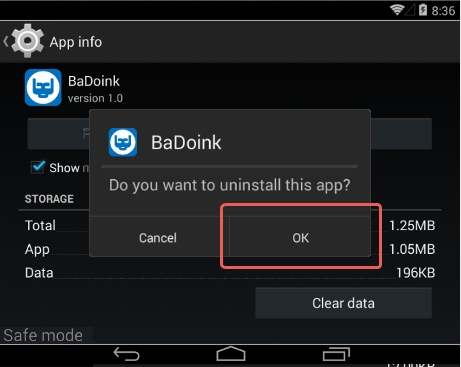
Step 5. Reboot your Android phone.
If guide 1 doesn’t remove the virus, you need to reset your Android phone to its factory default settings or want to permanently remove the virus from Android phone. Well, Safe Eraser can help you a favor. But it will delete all your personal data and apps from the phone without recovery, so make sure your important data is backed up. If you don’t know how to transfer your Android data to computer, you can follow here: how to transfer data from Android to PC.
If you’re sure your device has a virus, read on to find out how to remove it.
Step 1. Launch the Eraser Program on PC
After downloading and running the Safe Eraser program on your PC, you should connect your Android phone to computer via USB cable. Then you will see the following window:
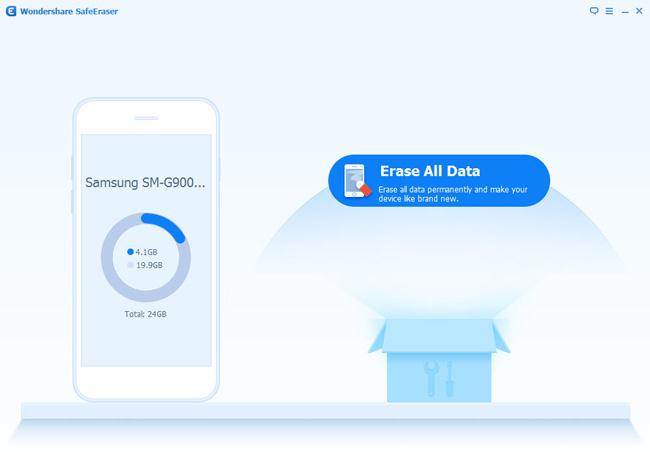
Step 2. Permanently Erase Data on Android Phone
Click the “Erase All Data” option, type in “delete” in the box to confirm it and hit “Erase Now” button, the software will start erasing present data stored on your Android phone and releasing phone storage.
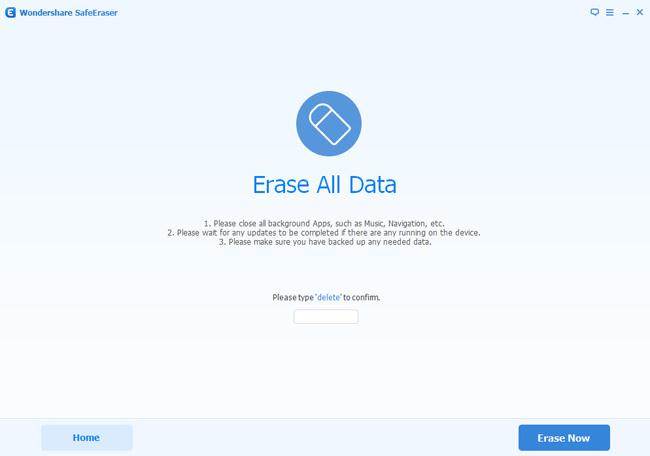
Step 3. Restore Android Phone to Factory Setting
All virus are removed from Android without restoring. Moreover, you can perform a factory reset on Android phone to erase all system data and settings on your Android phone if you want.
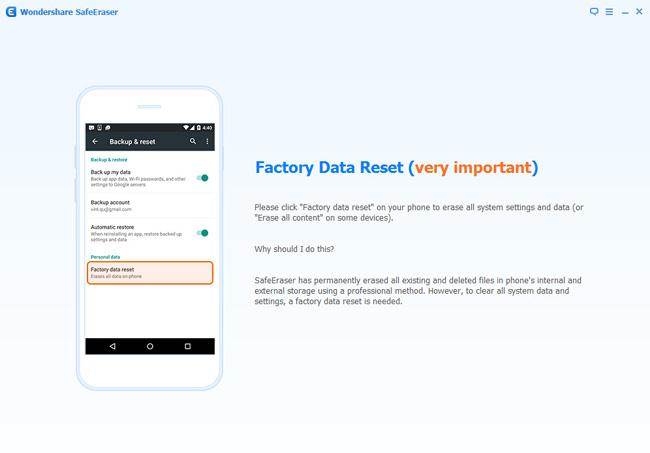
Read more:
How to Free Up Space on Android Phone and Tablet
How to Permanently Wipe Contacts on Android Phone
How to Permanently Clear Data from Samsung Phone and Tablet
Permanently Clear iPhone Memory Before Selling
comments powered by Disqus